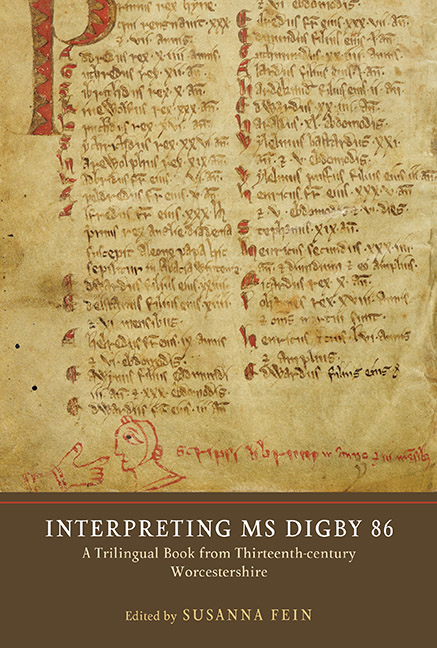Book contents
- Frontmatter
- Contents
- List of Illustrations
- List of Contributors
- Acknowledgements
- Abbreviations
- Digital Facsimiles of Frequently Cited Manuscripts
- The Contents of Oxford, Bodleian Library, Digby 86
- Note on the Presentation of MS Digby 86 Texts
- Introduction
- 1 Fellow Travellers with Saint Nicholas
- 2 Anglo-Norman Religious Instruction in MS Digby 86: Echoes of Lateran IV
- 3 Latin and Vernacular Prayers in MS Digby 86
- 4 Science, Medicine, Prognostication: MS Digby 86 as a Household Almanac
- 5 Literary Therapeutics: Experimental Knowledge in MS Digby 86
- 6 Petrus Alfonsi, the Disciplina clericalis and Le Romaunz Peres Aunfour of MS Digby 86
- 7 Misogyny in MS Digby
- 8 Gender Trouble? Fabliau and Debate in MS Digby 86
- 9 The Middle English Poetry of MS Digby 86
- 10 MS Digby 86 and Thirteenth-Century Scribal Poetics
- 11 The Scarlet Letter: Experimentation, Design and Copying Practice in the Coloured Capitals of MS Digby 86
- 12 Below Malvern: MS Digby 86, the Grimhills and the Underhills in their Regional and Social Context
- Bibliography
- Index of Manuscripts Cited
- General Index
- Manuscript Culture in the British Isles
10 - MS Digby 86 and Thirteenth-Century Scribal Poetics
Published online by Cambridge University Press: 24 October 2019
- Frontmatter
- Contents
- List of Illustrations
- List of Contributors
- Acknowledgements
- Abbreviations
- Digital Facsimiles of Frequently Cited Manuscripts
- The Contents of Oxford, Bodleian Library, Digby 86
- Note on the Presentation of MS Digby 86 Texts
- Introduction
- 1 Fellow Travellers with Saint Nicholas
- 2 Anglo-Norman Religious Instruction in MS Digby 86: Echoes of Lateran IV
- 3 Latin and Vernacular Prayers in MS Digby 86
- 4 Science, Medicine, Prognostication: MS Digby 86 as a Household Almanac
- 5 Literary Therapeutics: Experimental Knowledge in MS Digby 86
- 6 Petrus Alfonsi, the Disciplina clericalis and Le Romaunz Peres Aunfour of MS Digby 86
- 7 Misogyny in MS Digby
- 8 Gender Trouble? Fabliau and Debate in MS Digby 86
- 9 The Middle English Poetry of MS Digby 86
- 10 MS Digby 86 and Thirteenth-Century Scribal Poetics
- 11 The Scarlet Letter: Experimentation, Design and Copying Practice in the Coloured Capitals of MS Digby 86
- 12 Below Malvern: MS Digby 86, the Grimhills and the Underhills in their Regional and Social Context
- Bibliography
- Index of Manuscripts Cited
- General Index
- Manuscript Culture in the British Isles
Summary
THE main scribe's enthusiasm for conspicuous verse-form and rhyme is noted throughout Marilyn Corrie's doctoral study of Oxford, BodL, MS Digby 86. It may be manifested in his choice of text: La Besturne highlights rhyme and metre in its exuberant overturning of conventional expectations of versification, as does La Vie de un vallet amerous, while thirty-seven of the fifty lines of Les Deus Chevalers torz ke plederent a Roume end with the word tort (and the remaining lines end in words which assonate with tort). The Latin prayer Regina clemencie Maria vocata (art. 55iii) is structured by rhyme with groups of twenty or eighteen lines ending on the same disyllable. It perhaps also motivates some of the idiosyncratic rewritings and conflations that Corrie so meticulously identifies. The scribe adds a stanza from Le Vers de la mort to La Complainte de Jerusalem possibly because both share the same verse-form. Such attention to form is demonstrated not only in his choices and in his copying, but also in aspects of his mise en texte and mise en page. Quires xxii–xxvi are notable for the exuberance of his wavy red tie-lines extending into the margins. Introducing the manuscript's facsimile, Judith Tschann and Malcolm Parkes observe that the scribe ‘inserted braces to indicate the rhythmic structures of stanzas’, but go no further in explaining what forms are thus articulated.
This chapter dwells at more length on the thought processes that lie behind the Digby scribe's enthusiastic use of red tie-lines, as well as other types of scribal recognition of form, comparing the scribe's behaviour with that of others both near and somewhat further afield. A clutch of West Midland manuscripts relatively close in time and geography share some of their contents with Digby 86 and offer a sample against which to assess his practice. The Trinity manuscript is a trilingual miscellany of religious texts copied c. 1255–60 by at least nine scribes whose English dialects place them in Herefordshire (though one was from Arras in France); it has been associated with the nearby Worcester Franciscans or with one of the Benedictine houses in the area.
- Type
- Chapter
- Information
- Interpreting MS Digby 86A Trilingual Book from Thirteenth-Century Worcestershire, pp. 197 - 218Publisher: Boydell & BrewerPrint publication year: 2019
- 1
- Cited by



